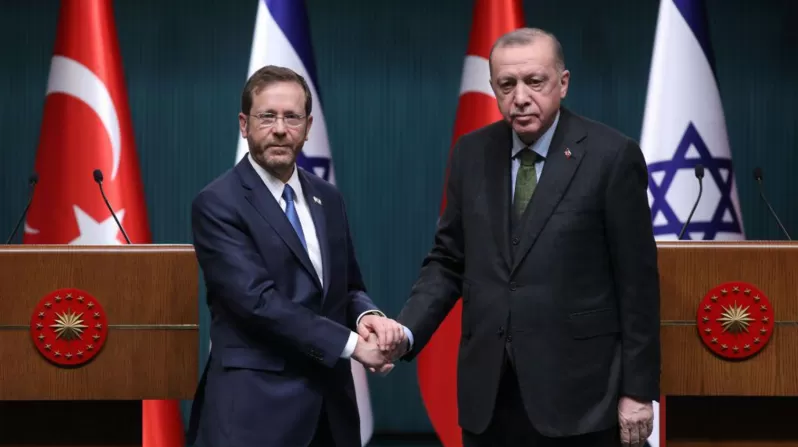With the escalating intensity of armed confrontations between Israel and Hamas that began following Hamas’s operation “The Storm of Al-Aqsa” on October 7th, Turkey has shown a keen interest in getting involved in efforts to contain these confrontations, put a stop to the violence, and explore ways to resolve the Palestinian issue.
However, when Israeli military operations in the Gaza Strip started and the United States rallied international support for Israel, Ankara adopted a different stance. President Recep Tayyip Erdoğan criticized these operations on October 28th, which led to Israel recalling its diplomats from Ankara as part of a diplomatic relations review process between the two nations.
Key Determinants
Turkey’s policy towards the ongoing military confrontations between Israel and Hamas has gradually evolved and can be addressed in the following determinants:
- Amid the escalating military confrontations, Turkey maintained open communication channels with Hamas, opting not to take an escalatory stance towards the group. This approach was particularly noteworthy following reports that Turkish authorities were considering deporting Ismail Haniyeh, the head of Hamas’ political bureau, from their territory.
The Turkish Presidential Communications Directorate’s Disinformation Combatting Center (DMM) refuted what it referred to as “claims reported by international and Israeli newspapers regarding President Recep Tayyip Erdoğan’s alleged demand for Hamas officials to leave Turkey.” In a statement on the social media platform “X”, they stated, “The assertions that President Erdoğan ordered senior Hamas officials to immediately depart Turkey are completely false.”
Furthermore, Turkey actively engaged with Hamas leadership. President Erdoğan conducted discussions with Ismail Haniyeh, the head of the political bureau of the organization, on October 21st. Turkish Foreign Minister Hakan Fidan also met with Haniyeh and a high-ranking delegation from Hamas on October 24th to address the evolving situation in the Gaza Strip.
- Expressing Concerns About Escalation: In his criticism of the ongoing military operation, President Erdoğan also expressed concerns that Israel’s actions were not mitigating tensions in the region but, instead, were provoking neighboring countries. This suggests that the continued military escalation in the Gaza Strip could potentially lead Iranian-backed militias to get involved by targeting Israeli sites and interests, thereby raising the costs of Tel Aviv’s military operations in the region. On October 28th, President Erdoğan called on Israel to immediately halt its operation, emphasizing in a tweet on “X”, “Israel must promptly end this state of turmoil and cease its attacks.”
- Galvanizing the Turkish Public Against the Operation: Turkish authorities took steps to rally the Turkish public against Israel’s military operation in the Gaza Strip. Significantly, various associations and civil organizations organized numerous demonstrations in support of Gaza in various Turkish provinces. Furthermore, the “Justice and Development Party” organized a demonstration on October 28th, with party leaders and prominent figures participating, to unequivocally oppose the ongoing operation.
- Halting Energy Sector Collaboration: Reports indicate that Turkey has decided to suspend planned energy projects with Israel. This decision became evident when the scheduled visit of the Turkish Minister of Energy, Alp Arslan Bayraktar, to Tel Aviv in the coming days was canceled. This visit was anticipated to bolster energy cooperation between the two nations, especially in light of the growing global demand for energy resources from the region.
- Seizing the Crisis for Critique of Western Policies: Ankara has been notable for leveraging the current war crisis to vocalize strong criticism of the policies adopted by Western countries, particularly the United States. This criticism is especially pronounced in the context of ongoing disputes between Turkey and some of these powers on various issues, including American support for Kurdish militias in northern Syria, which Turkey designates as terrorist groups, and U.S. pressure on Turkey to reduce military cooperation with Russia.
On October 22nd, Foreign Minister Hakan Fidan emphasized that “Israeli acts of violence against Palestinians have been tacitly approved by the West” and he further asserted that “European countries are applying double standards and supporting every action taken by Israel.”
Possible Options
The unfolding developments in the ongoing Gaza Strip conflict have given rise to numerous questions about Turkey’s stance and how it may evolve. Turkey seems to face three possible courses of action in the current war. The first option is to de-escalate tensions with Israel, particularly in response to the measures taken by Israel following Turkish officials’ criticism of the military operation in Gaza. Nonetheless, this approach may encounter significant resistance from a mobilized public that strongly opposes the operation and demands its immediate halt.
The second option is to maintain open communication channels with Hamas, a move that could have adverse consequences on Turkey’s relationships with both Israel and the United States in the future. This might lead to increased tensions with Israel and further exacerbate ongoing disputes with the United States.
The third option involves participating in regional and international efforts to secure a ceasefire. This option appears to be the most probable, given Turkey’s increasing concerns about the potential ramifications of an extended and expanding conflict. Such consequences could adversely affect not only the relationship between Ankara and Tel Aviv but also Turkish interests and actions on regional and international fronts.
In conclusion, Turkey’s shift towards a more assertive stance in response to the Gaza Strip developments is contingent on the extent and consequences of Israel’s ongoing military operation. Many regional and international powers, including Turkey, perceive the potential outcomes of this war as having a direct influence on the patterns of interactions and alliances that the Middle East region will witness in the upcoming phase.


